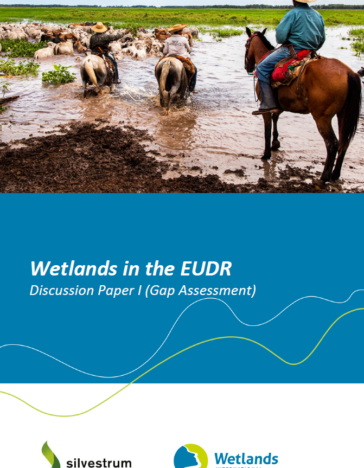
Scoping Paper Wetlands in the EUDR: Following the Workshop on The Impact of Commodities Production on Wetlands
-
Global Europe
The scoping paper on Wetlands In the EU Deforestation Free Products regulation was commissioned to prepare the ground for a thorough assessment of the impact of the law if wetlands were included in the scope.
To gather technical information in support of this work, Wetlands International Europe organized a first exploratory workshop on the Impact of commodities production of wetlands on 18 Decemebr 2024. It was addressed to wetland experts and aimed at gathering intelligence to determine how much the production of the seven commodities included in the EU Deforestation-Free Products Regulation (EUDR), adopted in June 2023, impacts wetlands globally and whether the law would benefit wetlands conservation.
The EUDR is a key component of the EU’s strategy to combat deforestation and forest degradation linked to global supply chains. This regulation requires companies placing certain commodities on the EU market (such as soy, palm oil, coffee, beef, wood, cocoa, and rubber) to ensure these products have not contributed to deforestation or forest degradation, whether legal or illegal, after December 31, 2020.
The law acknowledges the risk of deforestation’s impact on other natural resources and includes provisions for a review in 2024 of other wooded land and in 2025 of grasslands, wetlands, and peatlands. An impact assessment will provide the European Commission with the information needed to decide whether to expand the scope of the law.
The discussion were organised around the following questions: 1) Can we assess the magnitude of commodity production in wetlands? 2) Is the current definition of wetlands fit for the purpose of the law? 3) Are there available maps to track changes and impacts?
Next steps
It would seem important to focus, in the months ahead, both on minimal effort or cost-effective ways to bring wetlands into scope of the EUDR, as well as alternative approaches that reduce pressure on wetlands globally. The first effort would like on prioritizing specific wetland types, specific drivers, and robust MRV options. The second effort would look at incentive schemes, FLEGT approaches, emissions trading, and other approaches.
We will convene a follow-up workshop in the month of April 2025, allowing participants from the first workshop to participate and extending the scope to experts that work in any of the fields selected for alternative approaches.
Attached is the report of the workshop.

